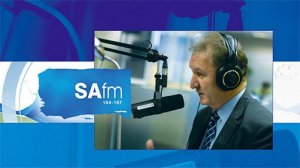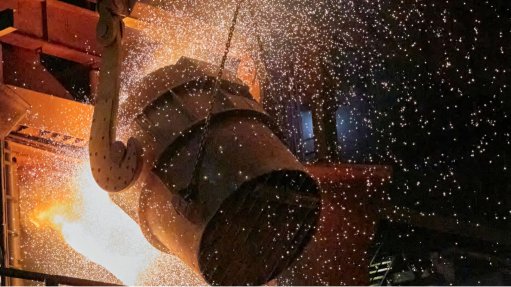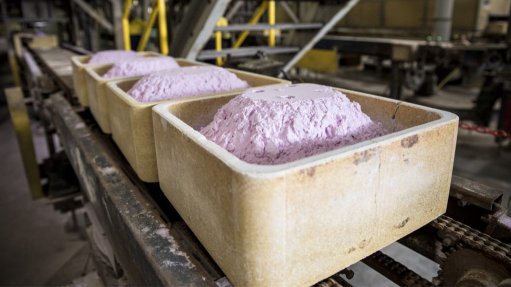On-The-Air (18/02/2022)
Every Friday, SAfm’s radio anchor Sakina Kamwendo speaks to Martin Creamer, publishing editor of Engineering News & Mining Weekly. Reported here is this Friday’s At the Coalface transcript:
Kamwendo: Mining company DRDGold has launched 41 programmes to take its communities out of poverty.
Creamer: Yes, you know, they mine the dumps around Johannesburg, Brakpan and around Carletonville. They are finding that there's absolute abject poverty around these dumps among the people living there, who are unemployed, and they're needing to feed themselves. DRDGold has set up a whole lot of initiatives and it has attracted 4 000 families and 5 000 pupils as well, because it gives extra math lessons, it gives extra science lessons, to try and boost an education culture in these areas.
They are having tremendous success and they are developing what they call the informal economy. They've started off showing people who to grow their own food. This begins with people growing vegetables in an area not bigger than a garage door, and they are growing enough to feed their families, but many now are stepping beyond that gradually. They are becoming informal entrepreneurs and starting to grow enough to be able sell the surplus produce that they don't need.
DRDGold, which is listed on the Johannesburg Stock Exchange and listed in New York, has got great confidence in the potential of developing the informal economy, which at the moment we find is being boosted by the social grants. They hope that situations of abject poverty can be reversed, and people can step out of poverty, and perhaps start on a new journey towards a better existence within the informal economy, which many say is not strong enough in South Africa. Many say That South Africa has one of the weakest informal sectors in Africa and we need to do a lot more to generate activity within the informal economy, as well as the formal economy.
Kamwendo: Cutting red tape will release R90-billion worth of mining projects out of their starting blocks.
Creamer: You know, there's so much red tape around, so it is very good news that President Ramaphosa has appointed a head of red tape, a person who knows all about how much red tape is in the country, that is Sipho Nkosi. Calculation done by Minerals Council South Africa that immediately, with the click of a finger, there are projects ready to go. If you remove the red tape, there is nearly R100-billion that can go into the economy virtually immediately.
These are shovel ready projects, as they call them. They in the area, first of all of exploration, and if you look at the Department of Mineral Resources and Energy, piling up there over a number of years have been applications for exploration. We've had so little exploration. For some reason or other, there are more than 4 000 exploration and prospecting applications that have just been piling up. Now it's a no brainer, if you click your finger and you actually approve those licences, you will have drilling in the ground almost immediately, you will have people around that, you will have consumables being used.
There'll be a lot of activity with the click of a finger. That is an area in which an estimated R30-billion worth of activity can be released very quickly. The other, of course, is in the renewable energy sector. And that again, is a no brainer, because it doesn't cost the taxpayer anything. The private sector gets involved. We are 4 000 megawatts to 6 000 megawatts short. That's why we are having all this load shedding. Ready to go are projects worth R60-billion in the renewable energy sector.
These are just in the mining sector alone, that could be funded by, sometimes not even the mining companies because there are so many core businesses that are focused directly on renewable energies, these people will do everything for those who in turn then buy the electricity going forward. There's also green finance available. So, it's an incredible time to take advantage of many factors that could lift us out of our terrible economic troubles at the moment – of great unemployment, worsening poverty and worsening inequality.
Kamwendo: Yet another company has announced that it is taking steps to generate its own electricity.
Creamer: This is, you know, Ergo, close to Brakpan. They take that mine dump sand, and they recover the gold from it. They have been having ups and downs, because with the load shedding situation, it creates a lot of disruption for them to process that material. So, they've decided to set up 20 megawatts initially, that's just initially there'll be doing a lot more, and then 10 sets of 10-megawatt storage. This is where it's very interesting on the storage side 100 megawatts worth of storage, they say there's more value in that than even generating solar power.
That is a business case all on its own, because these companies have to use electricity during peak periods. When you use electricity during peaks, you pay so much more for the electricity. What they are doing is they will set up their own power, store it, 100 megawatts worth. This is just the initial phase, so that they can actually use that during peak periods, which they again, say is just so robust, the payback is so quick. Already people are saying that they can generate their own electricity for less than half of what you're paying Eskom. With storage, it has become a must-do. So much more advanced technology has come in that make solar panels far more durable. In the case of Ergo, they were worried about the impact of hail because they are in a hail belt, and they thought, well, they could face costly damage.
But new technology has these solar panels so much more durable, better in quality, and lower in cost. It seems as if everybody is agreed that South Africa should go into the new solar, wind and storge era at lightning speed and produce our own clean, green electricity, at no cost to the taxpayer, and sometimes even no cost to the companies, and a long payback period with help of green finance.
Kamwendo: Thanks very much. Martin Creamer is publishing editor of Engineering News & Mining Weekly.
Article Enquiry
Email Article
Save Article
Feedback
To advertise email advertising@creamermedia.co.za or click here
Press Office
Announcements
What's On
Subscribe to improve your user experience...
Option 1 (equivalent of R125 a month):
Receive a weekly copy of Creamer Media's Engineering News & Mining Weekly magazine
(print copy for those in South Africa and e-magazine for those outside of South Africa)
Receive daily email newsletters
Access to full search results
Access archive of magazine back copies
Access to Projects in Progress
Access to ONE Research Report of your choice in PDF format
Option 2 (equivalent of R375 a month):
All benefits from Option 1
PLUS
Access to Creamer Media's Research Channel Africa for ALL Research Reports, in PDF format, on various industrial and mining sectors
including Electricity; Water; Energy Transition; Hydrogen; Roads, Rail and Ports; Coal; Gold; Platinum; Battery Metals; etc.
Already a subscriber?
Forgotten your password?
Receive weekly copy of Creamer Media's Engineering News & Mining Weekly magazine (print copy for those in South Africa and e-magazine for those outside of South Africa)
➕
Recieve daily email newsletters
➕
Access to full search results
➕
Access archive of magazine back copies
➕
Access to Projects in Progress
➕
Access to ONE Research Report of your choice in PDF format
RESEARCH CHANNEL AFRICA
R4500 (equivalent of R375 a month)
SUBSCRIBEAll benefits from Option 1
➕
Access to Creamer Media's Research Channel Africa for ALL Research Reports on various industrial and mining sectors, in PDF format, including on:
Electricity
➕
Water
➕
Energy Transition
➕
Hydrogen
➕
Roads, Rail and Ports
➕
Coal
➕
Gold
➕
Platinum
➕
Battery Metals
➕
etc.
Receive all benefits from Option 1 or Option 2 delivered to numerous people at your company
➕
Multiple User names and Passwords for simultaneous log-ins
➕
Intranet integration access to all in your organisation




















